- Understanding the Role of a Hiring Team
- Benefits of Using a Hiring Team
- Key Members and Their Roles
- How to Build a Hiring Team?
- Key Skills Required in a Hiring Team
- Metrics for Evaluating Success
- Creating & Using a Hiring Team: Best Practices
- Final Remarks
- Frequently Asked Questions
Hiring Team: Purpose, Composition, and Success Metrics
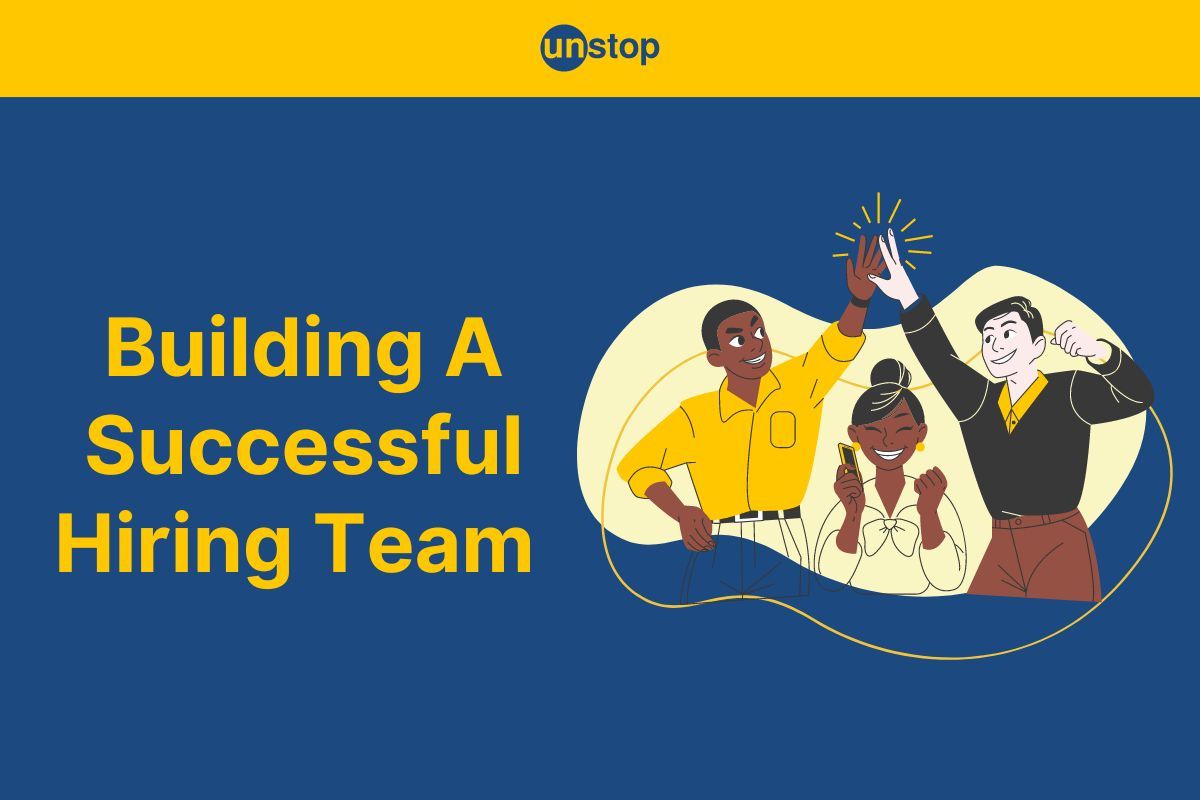
Multiple reports have revealed that more than half of organizations struggle with finding qualified candidates. Building a strong hiring team can make all the difference. A skilled hiring team not only streamlines the recruitment process but also enhances company culture and boosts productivity.
This post dives into effective strategies for creating a winning hiring team. Learn how to identify key roles, improve collaboration, and implement best practices that attract top talent. Let’s begin.
Understanding the Role of a Hiring Team
Definition
A hiring team is a group of individuals within an organization responsible for identifying, interviewing, and selecting candidates for open positions. This team typically consists of hiring managers, human resources professionals, and other relevant stakeholders who collaborate to assess candidates' qualifications and determine the best fit for the job.
Purpose
The hiring team is crucial to recruitment, ensuring that the company attracts and hires top talent to meet its staffing needs. The team members streamline hiring by working together to assess applicants. Collaborative hiring teams improve decision-making and reduce bias.
Hiring Team: Roles & Responsibilities
Different roles within the hiring team contribute to effective hiring. Each member brings unique skills to the table, enhancing the overall process. This team is typically responsible for the following functions:
- Identifying Hiring Needs: Determining the specific requirements for a new position.
- Job Posting and Sourcing: Creating job descriptions, posting job openings, and sourcing candidates.
- Screening Candidates: Reviewing resumes and cover letters, conducting phone interviews, and administering assessments.
- Interviewing Candidates: Conducting in-person or virtual interviews to assess candidates' qualifications and fit with the company culture.
- Making Hiring Decisions: Collaborating to select the best candidate for the position.
- Onboarding: Coordinating the onboarding process for the new hire.
Compare the top 10 onboarding software to find the one that best suits your hiring needs.
Assigning specific responsibilities to each role is important for efficiency. For example, one person might handle interviews while another checks references. This division of labor helps avoid confusion and ensures thoroughness. It also allows team members to specialize in various recruitment tasks.
Clear communication among recruitment team members is vital. Regular meetings keep everyone informed about progress and challenges. This collaboration leads to better candidate experiences and improved hiring outcomes.

Benefits of Using a Hiring Team
Using a hiring team offers several key benefits to organizations:
- Diverse Perspectives: A hiring team brings together different individuals with various expertise, ensuring a well-rounded evaluation of candidates in terms of skills, cultural fit, and experience.
- Improved Hiring Accuracy: Collaborative decision-making helps reduce bias and error in the hiring process, leading to better-quality hires and reducing the likelihood of turnover.
- Efficient Workload Distribution: Responsibilities such as sourcing, interviewing, and evaluating are shared among the team members, streamlining the hiring process and reducing the burden on a single individual.
- Better Candidate Experience: A coordinated hiring team can provide candidates with a more organized and professional experience, which improves the company's reputation and attractiveness to top talent.
- Enhanced Skill Assessment: With subject matter experts involved, the team can more accurately assess a candidate’s technical skills and suitability for the role, leading to more precise hiring decisions.
- Faster Decision-Making: By working collaboratively, the team can gather and share feedback quickly, speeding up the hiring process and reducing the risk of losing top candidates to competitors.
These benefits lead to better hiring outcomes, increased retention rates, and a stronger organizational culture.
Key Members and Their Roles

Hiring Manager
The hiring manager leads the hiring process. This person defines job requirements and sets expectations. They also make the final decision on candidates. Their insight ensures that the selected candidate fits the team culture.
Coordinator
The coordinator manages logistics for interviews and schedules. They communicate with candidates and keep everyone informed. This role is crucial for maintaining organization throughout the hiring process.
Recruiter
The recruiter focuses on sourcing and attracting talent. They screen resumes and conduct initial interviews. Recruiters use various platforms to find candidates who meet specific role needs. Their skills help identify top talent quickly.
Sourcer
The sourcer specializes in finding passive candidates. They use advanced search techniques to locate individuals who may not be actively looking for jobs. This role complements the recruiter by expanding the talent pool.
Interviewers
This role is usually assigned to current employees or managers who will work closely with the new hire. They are also responsible for providing input on the job requirements and qualifications and mentoring the new hire.
Understanding these different roles helps streamline the hiring process. Each member contributes uniquely to achieving recruitment goals. Clearly defined roles prevent confusion and enhance productivity.
How to Build a Hiring Team?
Building a strong hiring team requires a strategic approach to ensure you have the right mix of people who can assess candidates effectively. Here’s a step-by-step guide:
1. Identify Key Roles for the Team
Start by determining the essential members required for the hiring process. These typically include:
- Hiring Manager: The person responsible for the open position.
- Recruiter/HR: Focused on sourcing, screening, and coordinating the process.
- Potential Team Members: Employees who will work directly with the new hire to assess team fit. They provide insights about the job role and may even be a part of the interview panel, or be responsible for assessing submissions.
- Administrative Support: Handles scheduling and logistics.
The team may also include subject matter experts (SMEs). These are individuals who understand the technical or specialized aspects of the role.
2. Clarify Responsibilities and Roles
Define the specific duties of each team member. For example:
- Recruiters handle initial candidate outreach.
- Hiring managers focus on decision-making.
- Subject matter experts assess technical skills.
- Team members evaluate cultural fit.
3. Create a Structured Process
Develop a standardized hiring workflow, ensuring each member knows their role at different stages of the process (e.g., screening, interviews, feedback).
4. Establish Criteria for Success
Work with the hiring team to outline what constitutes a successful candidate. This includes both technical qualifications and cultural fit to align team expectations and reduce bias.
5. Provide Training
Equip the hiring team with the necessary skills for effective interviewing, legal considerations, and diversity and inclusion training. This ensures everyone is on the same page regarding how to evaluate candidates fairly.
6. Foster Communication and Feedback
Set up a system for open communication, allowing the hiring team to exchange feedback and insights. This can be done via collaborative tools like shared documents or recruitment platforms.
7. Evaluate and Adjust
After each hiring process, review the team’s performance to identify what worked and what didn’t. Continuously improving the hiring team based on outcomes will lead to better results in future recruitment efforts.
A well-constructed hiring team can significantly enhance the quality of new hires and the overall efficiency of the recruitment process.
Selecting Individuals for Hiring Team
Choosing the right individuals for each role is crucial. Assessing job requirements helps identify necessary skills and experiences. For instance, a recruiter may need strong interpersonal skills, while a technical expert should have in-depth knowledge of specific tools or technologies.
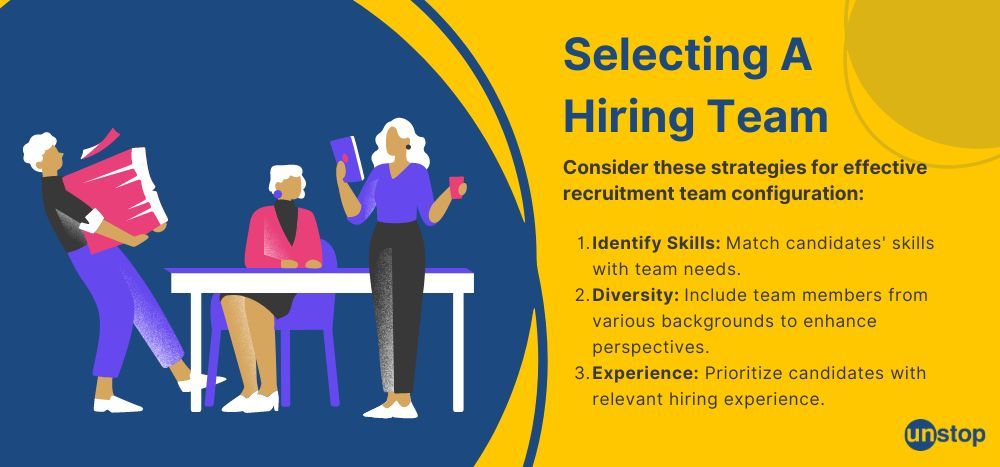
Adding team members with complementary strengths can improve performance. A well-rounded team can tackle challenges more effectively and make better hiring decisions.
Key Skills Required in a Hiring Team
A successful hiring team requires a mix of technical, interpersonal, and strategic skills to ensure the recruitment process is effective and delivers high-quality candidates. Here are the key skills needed:
1. Communication Skills
Clear and effective communication is crucial for conveying job requirements, evaluating candidates, and providing feedback. This ensures that everyone in the hiring team is aligned and that candidates receive consistent and professional communication throughout the process.
2. Interviewing Skills
Conducting thorough and unbiased interviews is a core skill for hiring teams. Members should be trained in asking the right questions, active listening, and evaluating responses objectively to assess both technical qualifications and cultural fit.
3. Technical Expertise
For roles that require specific skills, subject matter experts (SMEs) on the team need to have deep knowledge in the relevant field to assess a candidate’s technical capabilities accurately.
4. Decision-Making and Analytical Skills
The ability to analyze candidate data (resumes, interview performance, assessments) and make informed decisions is essential. This includes weighing trade-offs between experience, skills, and potential fit within the team.
5. Collaboration and Teamwork
Hiring teams must work well together, exchanging ideas and feedback to reach a consensus on the best candidates. Effective collaboration ensures that every perspective is considered in the hiring decision.
6. Diversity and Inclusion Awareness
A good hiring team understands the importance of creating an inclusive work environment and is trained to recognize unconscious biases. This helps in fostering a diverse workforce that brings a variety of perspectives.
7. Time Management and Organizational Skills
Managing recruitment timelines and keeping the process moving efficiently is key. The team must balance multiple candidates, schedule interviews, and manage documentation without delays or confusion.
8. Negotiation and Offer Management
The team should be skilled in negotiating offers and managing expectations, both internally with the hiring manager and externally with candidates, to ensure smooth offer acceptance.
9. Adaptability and Problem-Solving
Recruitment often faces unexpected challenges, such as changing job requirements or difficulty finding qualified candidates. The team must be adaptable and proactive in finding creative solutions.
10. Candidate Experience Focus
Ensuring a positive candidate experience is crucial. The team should have empathy and customer service skills to engage with candidates respectfully and ensure they have a professional, smooth experience throughout the hiring process.
These skills collectively help ensure that the hiring process is efficient, fair, and successful in attracting top talent to the organization.
Metrics for Evaluating Success
Key Performance Indicators
KPIs play a crucial role in assessing the effectiveness of the hiring team. Common metrics include time to hire, quality of hire, and candidate satisfaction. Time to hire measures how long it takes to fill a position. A shorter duration often indicates an efficient process. Quality of hire reflects the performance of new hires over time. Higher retention rates suggest successful hiring practices.
Tracking Candidate Progress
Tracking candidate progress is essential. It helps teams understand where candidates are in the hiring process. This tracking can reveal bottlenecks or delays in interviews and decisions. Timely updates on candidate status promote transparency and improve communication within the team. Monitoring hiring timelines ensures that all positions are filled promptly, meeting organizational needs.
Analyzing Team Performance
Using reports to analyze team performance is vital for growth. Regular analysis identifies areas needing improvement. For example, if a specific role consistently takes longer to fill, it may indicate issues with the job description or sourcing methods. Reports can also highlight trends in candidate feedback, allowing teams to adjust their strategies accordingly.
Creating & Using a Hiring Team: Best Practices
When creating and using a hiring team, there are several best practices to keep in mind to ensure a successful recruitment process.
- First and foremost, having a clear definition of roles and responsibilities helps avoid confusion between team members and ensures everyone knows what's expected of them.
- Another best practice is to establish clear communication channels within the team. Regular meetings, updates, and feedback sessions can help keep everyone on the same page and address any issues or concerns promptly.
- Additionally, diversity within the hiring team is crucial. Having a mix of perspectives, backgrounds, and experiences can lead to better decision-making and a more inclusive hiring process.
- It's also important to set clear goals and timelines for the hiring process. This helps keep the team focused and ensures that recruitment efforts are efficient and effective.
- Lastly, providing training and resources to the hiring team can help them stay up-to-date on best practices, legal requirements, and industry trends. Investing in the development of your team can lead to better outcomes in the long run.
Final Remarks
Building a strong hiring team is crucial for your organization's success. By doing so, you’ll not only attract top talent but also foster a positive work environment. Take the leap today to enhance your hiring strategy and watch your organization thrive.
Frequently Asked Questions
1. What is the purpose of a hiring team?
A hiring team streamlines the recruitment process. It ensures diverse perspectives, improves candidate selection, and enhances overall hiring efficiency.
2. Who are the key members of a hiring team?
Key members typically include HR representatives, hiring managers, and team leads. Each brings unique insights to assess candidates effectively.
3. How can I build an effective hiring team?
Start by defining roles clearly. Include diverse perspectives and ensure open communication. Regular training and feedback help maintain effectiveness.
4. What metrics should I use to evaluate hiring success?
Common metrics include time-to-hire, quality of hire, and candidate satisfaction scores. These indicators help refine your hiring process over time.
5. How can I improve the candidate experience during hiring?
Enhance communication, provide timely feedback, and streamline application processes. A positive experience fosters goodwill, even among rejected candidates.
6. Why is diversity important in a hiring team?
Diversity fosters innovation and creativity. It leads to better decision-making and reflects a broader range of customer perspectives in your organization.
7. How often should a hiring team meet?
Regular meetings are crucial—ideally weekly or bi-weekly during active recruitment phases. This keeps everyone aligned and responsive to candidate progress.
Suggested Reads:
I’m a reader first and a writer second, constantly diving into the world of content. If I’m not writing or reading, I like watching movies and dreaming of a life by the beach.
Login to continue reading
And access exclusive content, personalized recommendations, and career-boosting opportunities.
Subscribe
to our newsletter
Blogs you need to hog!
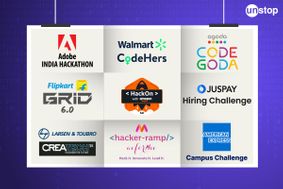
Organize Hackathons: The Ultimate Playbook With Past Case Studies

What is Campus Recruitment? How To Tap The Untapped Talent?
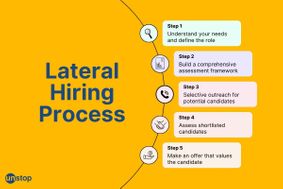
Lateral Hiring: A Complete Guide To The Process, Its Benefits, Challenges & Best Practices
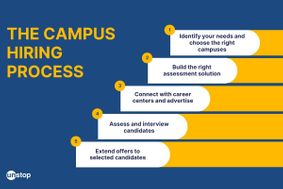











Comments
Add comment